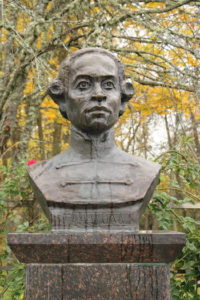
Abram Hannibal
On this date, we celebrate the birth of Abram Hannibal in 1697. He was a Black African slave who became a successful general and military engineer in Russia.
Hannibal was born in the Eritrean highland, north of the Mareb River, in a town called Logon.” the son of the reigning African prince. Some historians believe Hannibal was born in Ethiopia. However, more recent research by scholars has established that the general was instead likely born in Central Africa, in an area bordering Chad in present-day Cameroon.
At age eight, he was captured and taken to Turkey, where he was again kidnapped and taken to Moscow. He was given to the Czar, Peter the Great, who grew fond of him because of his intelligence. For ten years, Hannibal went everywhere with the Czar, who gave him the name Abram (after the famous African general) and Petrovich (after himself) Hannibal.
He completed his early schooling and was found to have a natural gift for mathematics and engineering. With his skill, he helped to assemble the naval port and fortress town of Kronstadt, which played an important role in the history of Russia. The Czar sent Abram to Paris to study engineering, and he stayed there for six years. During that time, he joined the French Army as a "commander," taking part in the Spanish war of the Czar’s Guard as an engineer lieutenant. Peter the Great died in 1725, and Hannibal was immediately banished to Siberia. There, he built the fortress of Selenchinsk, escaping only to be recaptured and returned to exile.
In 1741, a new ruler came to power, and Hannibal was restored to honor in the army, quickly rising to the rank of general. With his skill and intelligence, Hannibal made many contributions to Russia: He secured the boundary line between Russia and Sweden and was appointed to a post to inspect the forts of Russia. But his greatest achievements were his selection as commandant of the city of Reval and his promotion to a major in the Tomesk stronghold. After retiring from service in 1733, with the accession of Peter the Great’s daughter, Empress Elizabeth, he returned to the Court in 1741. She awarded him military promotions, engineering projects, and an estate near St. Petersburg, where he retired in 1762.
Hannibal illegally married Christina Regina Von Shoberg, the daughter of a German officer. The couple had 11 children, and in 1799, their granddaughter Nadezhda gave birth to Alexander Pushkin, the father of modern Russian literature and that country’s greatest poet. Hannibal died on May 14, 1781, and though he never knew his grandfather, Pushkin was enamored with his African heritage. Pushkin wrote a fictionalized biography of Hannibal, The Negro of Peter the Great, in 1837.
The Encyclopedia Britannica, Fifteenth Edition.
Copyright 1996 Encyclopedia Britannica Inc.
ISBN 0-85229-633-0